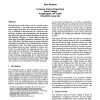31 search results - page 6 / 7 » sigcse 2000 |
SIGCSE
2002
ACM
14 years 11 months ago
2002
ACM
Building on ideas from a virtual workshop and additional input from the scientific community, the CISE Directorate at the National Science Foundation established the Information T...
106
click to vote
SIGCSE
2000
ACM
15 years 4 months ago
2000
ACM
Being exposed to well-written code is a valuable experience for students -- especially when the code is larger or more complex than they are currently capable of writing. In addit...
SIGCSE
2000
ACM
15 years 4 months ago
2000
ACM
Empirical skills are playing an increasingly important role in the computing profession and our society. But while traditional computer science curricula are effective in teaching...
SIGCSE
2008
ACM
14 years 11 months ago
2008
ACM
Summer camps offer a ripe opportunity for increasing computer science diversity. This panel provides several examples of summer camps that specifically recruit from traditionally ...
122
click to vote
SIGCSE
2000
ACM
15 years 4 months ago
2000
ACM
Classifying is a central activity in object-oriented programming and distinguishes it from procedural programming. Traditional logic, initiated by Aristotle, assigns classificatio...

